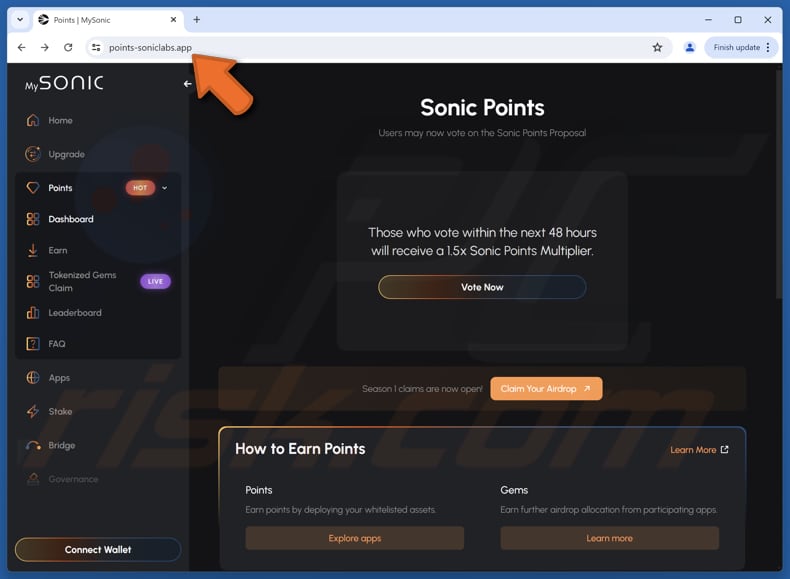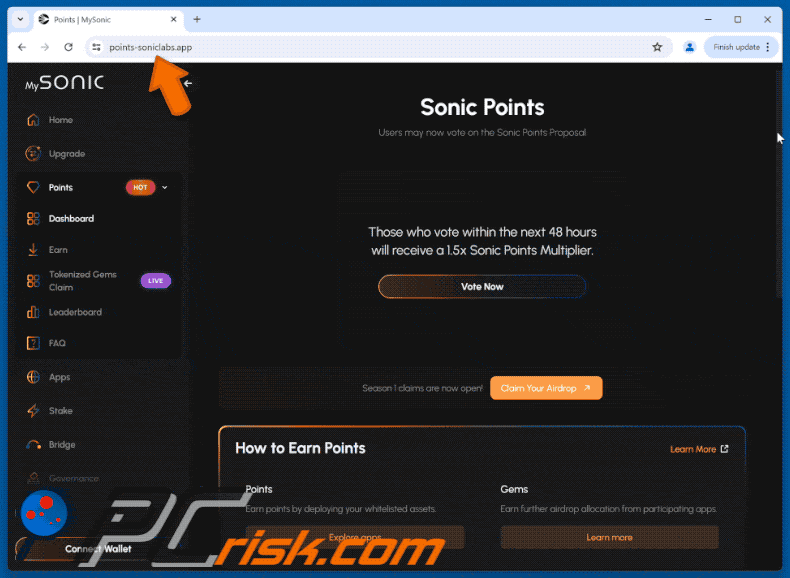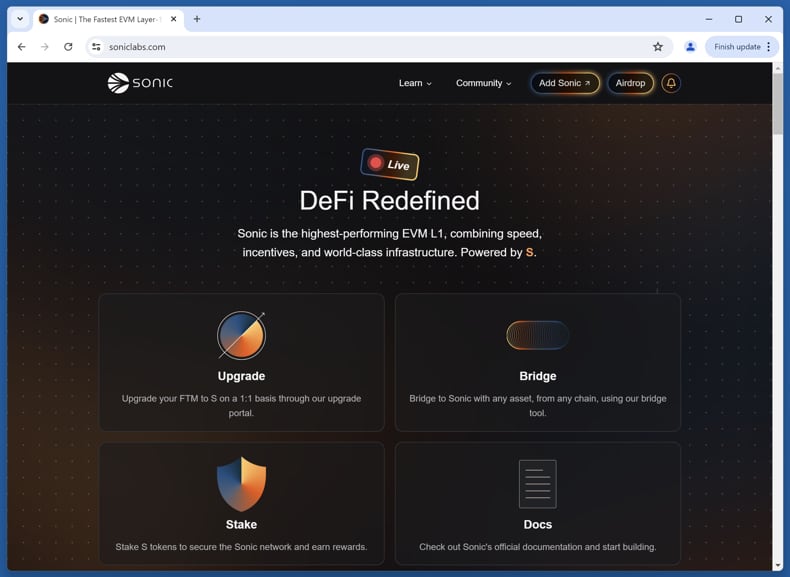How to identify scams like "Sonic Vote Rewards"
Phishing/ScamAlso Known As: Fake Sonic Vote Rewards website
Get free scan and check if your device is infected.
Remove it nowTo use full-featured product, you have to purchase a license for Combo Cleaner. Seven days free trial available. Combo Cleaner is owned and operated by RCS LT, the parent company of PCRisk.com.
What is the fake "Sonic Vote Rewards" site?
We have determined that points-soniclabs[.]app is a fake version of the Sonic platform (soniclabs.com) created to deceive users. It operates as a cryptocurrency scam that uses a malicious method to drain funds from victims' wallets. The site is unsafe and should be avoided.

IMPORTANT NOTE: We do not review crypto projects, please do your own research when investing money.
Federal Trade Commission (FTC) states that since the start of 2021, more than 46,000 people have reported losing over $1 billion in crypto to scams – that's about one out of every four dollars reported lost, more than any other payment method.
"Sonic Vote Rewards" scam in detail
Sonic (soniclabs.com) is a fast and efficient blockchain that works with Ethereum-based apps. It is built to handle many transactions very quickly. The platform uses its own token, S, for paying fees, staking, running validator nodes, and voting on decisions in the network.
On the fake website (points-soniclabs[.]app), users are offered to vote on the "Sonic Points Proposal". The site claims that those who vote within the next 48 hours will receive a 1.5x Sonic Points Multiplier. It also states that "Season 1 claims" are now open and invites users to claim their airdrop.
If visitors try to vote or claim the airdrop, they are requested to connect their wallets. Taking this step allows the fraudulent page to execute a malicious tool that empties wallets by sending funds straight to the attackers' wallet address. Because blockchain transfers cannot be undone, any stolen cryptocurrency is usually lost for good.
For this reason, users should always verify a platform's legitimacy before interacting with it. Numerous similar scams designed to drain crypto wallets exist, and it is important to know how to recognize them.
| Name | Fake Sonic Vote Rewards website |
| Threat Type | Scam, Social Engineering, Fraud |
| Fake Claim | Participants can receive free S tokens |
| Disguise | Legitimate airdrop launched by Sonic |
| Related Domain | points-soniclabs[.]app |
| Detection Names (points-soniclabs[.]app) | ChainPatrol (Malicious), CRDF (Malicious), Google Safebrowsing (Phishing), Kaspersky (Phishing), Trustwave (Phishing), Full List Of Detections (VirusTotal) |
| Symptoms | Unofficial domain, lack of official verification, unrealistic claims, too good-to-be-true promises |
| Distribution methods | Fake social media accounts, deceptive websites, rogue online advertisements |
| Damage | Cryptocurrency theft |
| Malware Removal (Windows) |
To eliminate possible malware infections, scan your computer with legitimate antivirus software. Our security researchers recommend using Combo Cleaner. Download Combo CleanerTo use full-featured product, you have to purchase a license for Combo Cleaner. 7 days free trial available. Combo Cleaner is owned and operated by RCS LT, the parent company of PCRisk.com. |
Conclusion
In conclusion, while Sonic (soniclabs.com) is a blockchain platform, points-soniclabs[.]app is a scam. It lures users with fake voting rewards and airdrops, asking them to connect their wallets. Doing so allows the attackers to steal funds using a malicious tool. Such pages should be avoided and ignored if encountered.
Some examples of similar scams are "Trust Wallet Security Breach", "Morphware (XMW) Vote Rewards", and "Beam Vote Rewards".
How did I open a scam website?
Scammers use hacked (or fake) social media accounts, especially on platforms like X (Twitter) and Facebook, or compromised WordPress websites to promote cryptocurrency scams. Users may also come across fraudulent schemes through links, buttons, ads, on questionable websites, or notifications sent from untrustworthy websites.
In other cases, adware infections, phishing emails containing links or files, and shady advertising networks (often found on torrent, adult, or illegal streaming sites) are used to drive traffic to fraudulent crypto-related pages.
How to avoid visiting scam pages?
Avoid interacting with pop-ups, ads, or links on suspicious websites, and never allow them to send notifications. Be cautious with unexpected or unsolicited emails and messages from unknown senders, and do not click on any links or attachments they contain. Download software and apps only from trusted app stores or official websites.
Regularly update your operating system and installed programs, and use reputable security software to perform routine scans. If your computer is already infected with unwanted apps, we recommend running a scan with Combo Cleaner Antivirus for Windows to automatically eliminate them.
The appearance of "Sonic Vote Rewards" scam (GIF):

The original Sonic website (soniclabs.com):

Instant automatic malware removal:
Manual threat removal might be a lengthy and complicated process that requires advanced IT skills. Combo Cleaner is a professional automatic malware removal tool that is recommended to get rid of malware. Download it by clicking the button below:
DOWNLOAD Combo CleanerBy downloading any software listed on this website you agree to our Privacy Policy and Terms of Use. To use full-featured product, you have to purchase a license for Combo Cleaner. 7 days free trial available. Combo Cleaner is owned and operated by RCS LT, the parent company of PCRisk.com.
Quick menu:
- What is Fake Sonic Vote Rewards website?
- How to identify a pop-up scam?
- How do pop-up scams work?
- How to remove fake pop-ups?
- How to prevent fake pop-ups?
- What to do if you fell for a pop-up scam?
How to identify a pop-up scam?
Pop-up windows with various fake messages are a common type of lures cybercriminals use. They collect sensitive personal data, trick Internet users into calling fake tech support numbers, subscribe to useless online services, invest in shady cryptocurrency schemes, etc.
While in the majority of cases these pop-ups don't infect users' devices with malware, they can cause direct monetary loss or could result in identity theft.
Cybercriminals strive to create their rogue pop-up windows to look trustworthy, however, scams typically have the following characteristics:
- Spelling mistakes and non-professional images - Closely inspect the information displayed in a pop-up. Spelling mistakes and unprofessional images could be a sign of a scam.
- Sense of urgency - Countdown timer with a couple of minutes on it, asking you to enter your personal information or subscribe to some online service.
- Statements that you won something - If you haven't participated in a lottery, online competition, etc., and you see a pop-up window stating that you won.
- Computer or mobile device scan - A pop-up window that scans your device and informs of detected issues - is undoubtedly a scam; webpages cannot perform such actions.
- Exclusivity - Pop-up windows stating that only you are given secret access to a financial scheme that can quickly make you rich.
Example of a pop-up scam:

How do pop-up scams work?
Cybercriminals and deceptive marketers usually use various advertising networks, search engine poisoning techniques, and shady websites to generate traffic to their pop-ups. Users land on their online lures after clicking on fake download buttons, using a torrent website, or simply clicking on an Internet search engine result.
Based on users' location and device information, they are presented with a scam pop-up. Lures presented in such pop-ups range from get-rich-quick schemes to fake virus scans.
How to remove fake pop-ups?
In most cases, pop-up scams do not infect users' devices with malware. If you encountered a scam pop-up, simply closing it should be enough. In some cases scam, pop-ups may be hard to close; in such cases - close your Internet browser and restart it.
In extremely rare cases, you might need to reset your Internet browser. For this, use our instructions explaining how to reset Internet browser settings.
How to prevent fake pop-ups?
To prevent seeing pop-up scams, you should visit only reputable websites. Torrent, Crack, free online movie streaming, YouTube video download, and other websites of similar reputation commonly redirect Internet users to pop-up scams.
To minimize the risk of encountering pop-up scams, you should keep your Internet browsers up-to-date and use reputable anti-malware application. For this purpose, we recommend Combo Cleaner Antivirus for Windows.
What to do if you fell for a pop-up scam?
This depends on the type of scam that you fell for. Most commonly, pop-up scams try to trick users into sending money, giving away personal information, or giving access to one's device.
- If you sent money to scammers: You should contact your financial institution and explain that you were scammed. If informed promptly, there's a chance to get your money back.
- If you gave away your personal information: You should change your passwords and enable two-factor authentication in all online services that you use. Visit Federal Trade Commission to report identity theft and get personalized recovery steps.
- If you let scammers connect to your device: You should scan your computer with reputable anti-malware (we recommend Combo Cleaner Antivirus for Windows) - cyber criminals could have planted trojans, keyloggers, and other malware, don't use your computer until removing possible threats.
- Help other Internet users: report Internet scams to Federal Trade Commission.
Frequently Asked Questions (FAQ)
What is a fake crypto airdrop?
A fake crypto airdrop is a scam that pretends to be a real token giveaway. It usually shows up on fake websites or social media posts, promising free cryptocurrency to lure users.
What is the purpose of a fake crypto airdrop?
Typically, the scammers running these schemes try to steal cryptocurrency. They use malicious tools, steal personal information, or use other methods to steal crypto.
Why do I encounter scam websites?
Scammers spread their scams through compromised websites, hacked or fake social media accounts, deceptive emails, misleading pop-ups or ads on shady pages, fake alerts from untrustworthy sites, and rogue advertising networks commonly seen on torrent, adult, and illegal streaming platforms.
Will Combo Cleaner protect me from scams?
Combo Cleaner identifies unreliable and deceptive websites, warns users about possible risks, and prevents users from accessing them.
Share:

Tomas Meskauskas
Expert security researcher, professional malware analyst
I am passionate about computer security and technology. I have an experience of over 10 years working in various companies related to computer technical issue solving and Internet security. I have been working as an author and editor for pcrisk.com since 2010. Follow me on Twitter and LinkedIn to stay informed about the latest online security threats.
PCrisk security portal is brought by a company RCS LT.
Joined forces of security researchers help educate computer users about the latest online security threats. More information about the company RCS LT.
Our malware removal guides are free. However, if you want to support us you can send us a donation.
DonatePCrisk security portal is brought by a company RCS LT.
Joined forces of security researchers help educate computer users about the latest online security threats. More information about the company RCS LT.
Our malware removal guides are free. However, if you want to support us you can send us a donation.
Donate
▼ Show Discussion